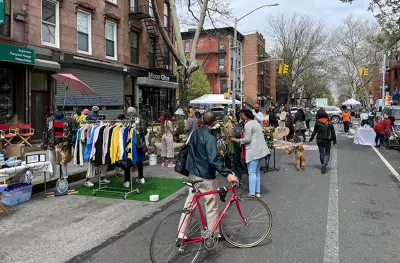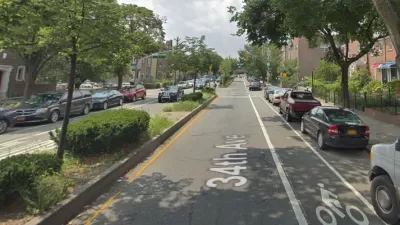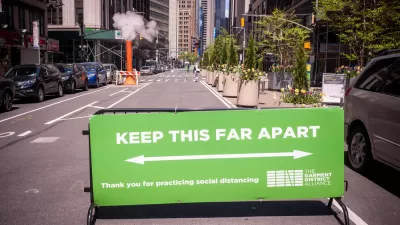As city funding runs out, the number of miles in open streets projects has dwindled from 83 to just 20.

Two high-profile New York City open streets will end or cut back their programming, potentially signaling a decline in the pandemic-era project, reports Kim Velsey in Curbed.
Park Slope’s Fifth Avenue Open Street won’t be returning this year, and Vanderbilt Avenue will cut back its season and hours. According to Velsey, this is in part because “the city left it up to local groups to pay for and run a program it has long treated as a kind of block party, and four years in, the money has run out.”
Velsey adds, “Because this has been the model, wealthy areas that could raise funds ended up having more open streets than lower-income ones, which confused public-space improvements (which benefited pretty much anyone who wasn’t trying to drive through at that particular time) with gentrification.” By the time the program was two years old, the miles of open streets in the city dropped from 83 to 20.
Advocates say the city should fund the program in the same way that other cities around the world do. According to a DOT spokesperson, the city is spending $30 million in public spaces, including its Plaza Equity Program, which supports open streets efforts but which, according to the article, has been slow to pay out participating groups.
FULL STORY: Is This the End of Open Streets?

Alabama: Trump Terminates Settlements for Black Communities Harmed By Raw Sewage
Trump deemed the landmark civil rights agreement “illegal DEI and environmental justice policy.”

Planetizen Federal Action Tracker
A weekly monitor of how Trump’s orders and actions are impacting planners and planning in America.

The 120 Year Old Tiny Home Villages That Sheltered San Francisco’s Earthquake Refugees
More than a century ago, San Francisco mobilized to house thousands of residents displaced by the 1906 earthquake. Could their strategy offer a model for the present?

In Both Crashes and Crime, Public Transportation is Far Safer than Driving
Contrary to popular assumptions, public transportation has far lower crash and crime rates than automobile travel. For safer communities, improve and encourage transit travel.

Report: Zoning Reforms Should Complement Nashville’s Ambitious Transit Plan
Without reform, restrictive zoning codes will limit the impact of the city’s planned transit expansion and could exclude some of the residents who depend on transit the most.

Judge Orders Release of Frozen IRA, IIJA Funding
The decision is a victory for environmental groups who charged that freezing funds for critical infrastructure and disaster response programs caused “real and irreparable harm” to communities.
Urban Design for Planners 1: Software Tools
This six-course series explores essential urban design concepts using open source software and equips planners with the tools they need to participate fully in the urban design process.
Planning for Universal Design
Learn the tools for implementing Universal Design in planning regulations.
Clanton & Associates, Inc.
Jessamine County Fiscal Court
Institute for Housing and Urban Development Studies (IHS)
City of Grandview
Harvard GSD Executive Education
Toledo-Lucas County Plan Commissions
Salt Lake City
NYU Wagner Graduate School of Public Service





























